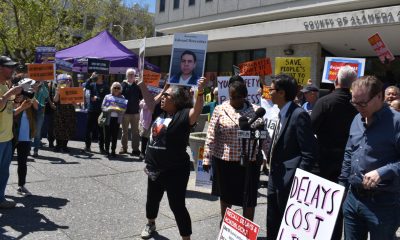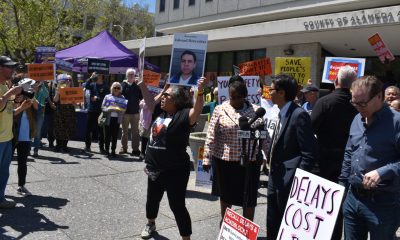Business
Balance Your People and Profits: Cal Bill Pushes Amazon, Walmart, and Other Big E-Retailers
Gonzales said she authored AB 701 to help decrease worker injury, encourage more transparency, and end the use of production quotas at corporations and government agencies, which critics say contribute to low job satisfaction and harmful working conditions.

Last week, warehouse workers, labor leaders, elected officials, and community groups came together on the steps of the California state Capitol. Their goal was to generate public support for California’s pro-worker “Warehouse Workers Protection Act,” – also called Assembly Bill (AB) 701– and to encourage the state Senate to pass it.
“Working in warehouses for corporations like Amazon has quickly become one of the most dangerous jobs in the private sector,” Assemblywoman Lorena Gonzalez (D-San Diego) asserted, placing giant e-retailers square in the scope of her target.
In the United States, e-commerce is skyrocketing, growing from a $441.51 billion industry in 2017 into a market valued at $759.47 billion in 2020. Amazon.com has the largest market share (about 40%) among leading e-retailers, followed by Walmart (about 7%) and eBay (about 4%).
Gonzales said she authored AB 701 to help decrease worker injury, encourage more transparency, and end the use of production quotas at corporations and government agencies, which critics say contribute to low job satisfaction and harmful working conditions.
“Workers are risking their bodies to guarantee same-day delivery and being pushed to the point that many can’t even break long enough to use the bathroom. There is no excuse for a company to prioritize customers’ convenience and their own profits over the safety of their workers,” said Gonzales.
In March 2020, Irene Tung and Deborah Berkowitz released a National Employment Law Project (NELP) report titled “Amazon’s Disposable Workers: High Injury and Turnover Rates at Fulfillment Centers in California.”
According to the study, “Workers who can’t keep up extreme productivity goals are fired or encouraged to quit.”
“Amazon workers around the country have reported being subject to unsustainably fast productivity requirements resulting in injury and exhaustion. Workers describe pushing their bodies to the brink to avoid automatic termination for missing quotas,” the NELP report stated. “Data from the company’s own records have confirmed their accounts showing that Amazon warehouses have stunningly high injury rates.”
Assemblymember Ash Kalra (D-San Jose), chairperson of Assembly Labor Committee; state Senator Dave Cortese (D-San Jose), chair of Senate Labor Committee; state Senator Maria Elena Durazo (D-Los Angeles); and chair of the Assembly Public Safety Committee Reggie Jones-Sawyer (D-Los Angeles) all attended the rally.
Jones-Sawyer said his 19-year-old son worked at Amazon this past summer before heading off to college in Colorado. He got sick and had to take time off work. When he returned to work, after three weeks he was fired.
“Unfortunately, he saw all the bad things about working in a factory,” Jones-Sawyer said.
Jones-Sawyer said he attended the rally for his son.
“So that’s why I am here, not only for my son but all the other sons who don’t have fathers who could speak up for them,” he said. When it comes back to the Assembly for concurrence, I will stand up, speak up and vote for it again.
The language in AB 701 directs the California Division of Occupational Safety and Health (Cal/OSHA) to establish new standards by Jan. 1, 2023, that are “designed to minimize the risk of injuries and disorders among warehouse employees who are subject to production quotas.
The California Chamber of Commerce (CalChamber) labeled AB 701 “job killer legislation” in April and criticized it as one of “23 legislative bills that would place California employers and the state’s economy in harm’s way” should it become law.
“(AB 701) threatens warehouse employers with duplicative costly litigation by creating a new, independent private right of action, and a representative action under the Private Attorneys General Act (PAGA), for failing to comply with vague standards,” CalChamber said in a statement. The organization is the largest business advocate in California.
In California, Amazon warehouses are in counties whose populations are “overwhelmingly people of color,” according to the NELP study. Combined, nearly 75% of warehouse workers are minorities. Of that number about 55% are Latinos and about 9% are Black.
If passed by the Senate and signed by Gov. Gavin Newsom, AB 701 would require employers to inform employees about quotas that corporations and organizations set to measure their performance.
The legislation requires employers to quantify work employees are expected to do. They must explain specific tasks and how meeting those goals may affect their job standing.
“AB 701 also directs the Division of Occupational Safety and Health (Cal/OSHA) to establish new standards by Jan. 1, 2023, that are “designed to minimize the risk of injuries and disorders among warehouse employees who are subject to production quotas.”
The bill also prohibits an employer from taking disciplinary action (including firing) against employees for failure to meet quotas that have not been disclosed to them. In addition, the legislation prohibits quotas that do not allow a worker to comply with meal or rest periods or occupational health and safety laws.
Bay Area
Mayor Breed Proposes Waiving City Fees for Night Markets, Block Parties, Farmers’ Markets, Other Outdoor Community Events
Mayor London N. Breed introduced legislation on April 26 to encourage and expand outdoor community events. The first will waive City fees for certain events, making them less costly to produce. The second will simplify the health permitting for special event food vendors through the creation of an annual permit. Both pieces of legislation are part of the Mayor’s broader initiative to bring vibrancy and entertainment to San Francisco’s public right of ways and spaces.

Mayor’s Press Office
Mayor London N. Breed introduced legislation on April 26 to encourage and expand outdoor community events.
The first will waive City fees for certain events, making them less costly to produce. The second will simplify the health permitting for special event food vendors through the creation of an annual permit. Both pieces of legislation are part of the Mayor’s broader initiative to bring vibrancy and entertainment to San Francisco’s public right of ways and spaces.
Outdoor community events are integral to San Francisco’s vibrant culture and sense of community. These events include night markets, neighborhood block parties and farmers markets, and bolster the City’s economy by supporting local businesses and attracting tourists eager to experience San Francisco’s unique charm and food scene.
They offer residents, workers and visitors, opportunities to engage with local artists, musicians, and food vendors while enjoying the San Francisco’s stunning outdoor spaces and commercial corridors.
The legislation will allow for more and new community gatherings and for local food vendors to benefit from the City’s revitalization.
“San Francisco is alive when our streets are filled with festivals, markets, and community events,” said Breed. “As a city we can cut fees and streamline rules so our communities can bring joy and excitement into our streets and help revitalize San Francisco.”
Fee Waiver Legislation
The events that can take advantage of the new fee waivers are those that are free and open to the public, occupy three or fewer city blocks, take place between 8 a.m. and 10 p.m., and have the appropriate permitting from the ISCOTT and the Entertainment Commission.
The applicant must be a San Francisco based non-profit, small business, Community Benefit District, Business Improvement District, or a neighborhood or merchant association. Fees eligible for waiver include any application, permit, and inspection/staffing fees from San Francisco Municipal Transportation Agency, Department of Public Health, Fire Department, Entertainment Commission, and Police Department.
Currently, it can cost roughly anywhere between $500-$10,000 to obtain permits for organized events or fairs, depending on its size and scope. Organizations and businesses are limited to a maximum of 12 events in one calendar year for which they can receive these fee waivers.
Food Vendor Streamlining Legislation
The second piece of legislation introduced will help special event food vendors easily participate in multiple events throughout the year with a new, cost-effective annual food permit. Food vendors who participate in multiple events at multiple locations throughout the year will no longer need to obtain a separate permit for each event. Instead, special event food vendors will be able to apply and pay for a single annual permit all at once.
“Many successful food businesses either begin as pop-up vendors or participate in special events to grow their business,” says Katy Tang, Director of the Office of Small Business. “Giving them the option for an annual special event food permit saves them time and money.”
Currently, food vendors are required to get a Temporary Food Facility (TFF) permit from the Department of Public Health (DPH) in order to participate in a special event, among permits from other departments.
Currently, each special event requires a new permit from DPH ranging from $124-$244, depending on the type of food being prepared and sold. Last year, DPH issued over 1,500 individual TFF permits. With the new annual permit, food vendors selling at more than four to six events each year will benefit from hundreds of dollars in savings and time saved from fewer bureaucratic processes.
“This legislation is a step in the right direction to make it easier for food vendors like me to participate in citywide events,” said Dontaye Ball, owner of Gumbo Social. “It saves on time, money and makes it more effective. It also creates a level of equity.”
Bay Area
Faces Around the Bay: Sidney Carey
Sidney Carey was born in Dallas, Texas. He moved with his family to West Oakland as a baby. His sister is deceased; one brother lives in Oakland. Carey was the Choir Director at Trinity Missionary Baptist Church for 18 years.

By Barbara Fluhrer
Sidney Carey was born in Dallas, Texas. He moved with his family to West Oakland as a baby. His sister is deceased; one brother lives in Oakland.
Carey was the Choir Director at Trinity Missionary Baptist Church for 18 years.
He graduated from McClymonds High with a scholarship in cosmetology and was the first African American to complete a nine-month course at the first Black Beauty School in Oakland: Charm Beauty College.
He earned his License, and then attended U.C., earning a secondary teaching credential. With his Instructors License, he went on to teach at Laney College, San Mateo College, Skyline and Universal Beauty College in Pinole, among others.
Carey was the first African American hair stylist at Joseph and I. Magnin department store in Oakland and in San Francisco, where he managed the hair stylist department, Shear Heaven.
In 2009, he quit teaching and was diagnosed with Congestive Heart Failure. He was 60 and “too old for a heart transplant”. His doctors at California Pacific Medical Center (CPMC) went to court and fought successfully for his right to receive a transplant. One day, he received a call from CPMC, “Be here in one hour.” He underwent a transplant with a heart from a 25-year- old man in Vienna, Austria
Two years later, Carey resumed teaching at Laney College, finally retiring in 2012.
Now, he’s slowed down and comfortable in a Senior Residence in Berkeley, but still manages to fit his 6/4” frame in his 2002 Toyota and drive to family gatherings in Oakland and San Leandro and an occasional Four Seasons Arts concert.
He does his own shopping and cooking and uses Para Transit to keep constant doctor appointments while keeping up with anti-rejection meds. He often travels with doctors as a model of a successful heart-transplant plant recipient: 14 years.
Carey says, “I’m blessed” and, to the youth, “Don’t give up on your dreams!”
Business
Maximizing Your Bank Branch Experience
In a world of online tools that let you make banking transactions with the touch of a button, the idea of visiting a branch might seem unnecessary. However, if you haven’t visited your local branch recently, you might be surprised by what it has to offer. Your branch is much more than a place to deposit and withdraw money – it can offer the opportunity to build valuable relationships with people who can help you achieve financial independence.

Sponsored by JPMorgan Chase & Co.
In a world of online tools that let you make banking transactions with the touch of a button, the idea of visiting a branch might seem unnecessary.
However, if you haven’t visited your local branch recently, you might be surprised by what it has to offer. Your branch is much more than a place to deposit and withdraw money – it can offer the opportunity to build valuable relationships with people who can help you achieve financial independence.
Diedra Porché, Head of Community and Business Development at Chase, talks about how the bank model has evolved to maximize the branch experience for customers; how connecting with your local branch team can help you think differently about money and investing for your future.
How can a customer feel connected to a bank branch?
I love that question because we ask ourselves the same thing every day. Being part of the community means meeting with local leaders to find out what they need from us and then designing our branches around that. For example, at some of our community branches we have what we call a living room where we can host financial workshops, small business pop-up shops or nonprofit organization meetings. We also hire locally. You feel much more connected talking about financial aspirations with people from your community who went to the same high school, place of worship or maybe frequented the same recreation center down the street when they grew up.
How can I build a relationship with my bank?
Customers should feel comfortable sharing their goals, needs and wants with their banker. Also, it helps to remember the Community Manager is there to help solve your finance challenges and build a roadmap for success. You might have a short-term or long-term goal to open a business, build your credit, become debt-free, buy a home, or save for retirement, and our community team can help. At Chase, we strive to make dreams possible for everyone, everywhere, every day. Your financial future starts with building those relationships.
How can customers change negative perceptions they have about managing their money?
Far too often, customers are intimidated when they visit a bank. Our goal is to demystify banking and money myths empowering people to make the right decisions. For example, a big myth is assuming you need a lot of money to have a bank account. You don’t! Another myth is you need to carry a balance on your credit card to build credit — actively using your credit card can demonstrate that you can use credit responsibly but carrying a balance won’t necessarily improve your credit score. Finally, understanding mobile and online banking safety is key. There are so many safeguards and protections in place to guard your personal information and funds.
What’s an easy step one can take to shift their financial behavior right now?
Cultivating self-awareness is a good first step. Start by taking inventory of your spending. Be honest with yourself about what you need and what you want. Too often, people confuse the two, which leads to bad decisions. Rent is something you need to pay. An extra pair of shoes is something you may want but before you buy them ask yourself if that’s the best use of your hard-earned money. Too often, our beliefs and our fears shape our financial realities. If any of those beliefs are limiting your financial behavior, it’s important to question and examine them, and then decide you’re open to learning something different.
What’s one perception about banking that you’d like to change?
I think folks are surprised there are so many resources available and accessible both at our branches and online, it’s always a good idea to visit a nearby branch and speak to a Community Manager or banker. Outside of what we offer in-branch, our teams also work with local neighborhood partners who provide a variety of services to support the community, businesses and residents. I received a unique piece of feedback from an employee who started with the bank and had lived in the same community his whole life. When he visited his local community branch, he said, “Diedra, when I walked in, I felt dignified.” Every time I recount that story, it warms my heart because that’s what we want — we want our centers to belong to the community.
-

 Community3 weeks ago
Community3 weeks agoFinancial Assistance Bill for Descendants of Enslaved Persons to Help Them Purchase, Own, or Maintain a Home
-

 Business3 weeks ago
Business3 weeks agoV.P. Kamala Harris: Americans With Criminal Records Will Soon Be Eligible for SBA Loans
-

 Activism4 weeks ago
Activism4 weeks agoOakland Post: Week of April 10 – 16, 2024
-

 Community3 weeks ago
Community3 weeks agoAG Bonta Says Oakland School Leaders Should Comply with State Laws to Avoid ‘Disparate Harm’ When Closing or Merging Schools
-

 Activism2 weeks ago
Activism2 weeks agoOakland Post: Week of April 24 – 30, 2024
-

 City Government3 days ago
City Government3 days agoCourt Throws Out Law That Allowed Californians to Build Duplexes, Triplexes and RDUs on Their Properties
-

 Community2 weeks ago
Community2 weeks agoRichmond Nonprofit Helps Ex-Felons Get Back on Their Feet
-

 Community2 weeks ago
Community2 weeks agoOakland WNBA Player to be Inducted Into Hall of Fame



















































